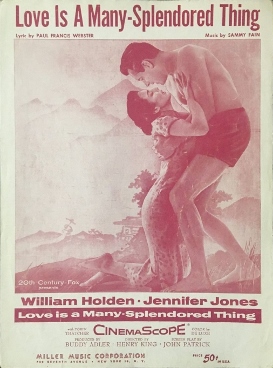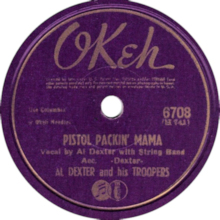Related Research Articles

"Secret Love" is a song composed by Sammy Fain (music) and Paul Francis Webster (lyrics) for Calamity Jane, a 1953 musical film in which it was introduced by Doris Day in the title role. Ranked as a number 1 hit for Day on both the Billboard and Cash Box, the song also afforded Day a number 1 hit in the UK. "Secret Love" has subsequently been recorded by a wide range of artists, becoming a C&W hit firstly for Slim Whitman and later for Freddy Fender, with the song also becoming an R&B hit for Billy Stewart, whose version also reached the top 40 as did Freddy Fender's. In the UK, "Secret Love" would become the career record of Kathy Kirby via her 1963 remake of the song. The melody bears a slight resemblance to the opening theme of Schubert's A-major piano sonata, D.664.

"Love Is a Many-Splendored Thing" is a popular song with music by Sammy Fain and lyrics by Paul Francis Webster. The song appeared first in the movie Love Is a Many-Splendored Thing (1955), and it won the Academy Award for Best Original Song in 1956. From 1967 to 1973, it was also used as the theme song to Love is a Many Splendored Thing, the soap opera based on the movie.
"If I Give My Heart to You" is a popular song written by Jimmy Brewster, Jimmie Crane, and Al Jacobs. The most popular versions of the song were recorded by Doris Day and by Denise Lor; both charted in 1954.
"Hey There" is a show tune from the musical play The Pajama Game, written by Richard Adler and Jerry Ross. It was published in 1954. It was introduced by John Raitt in the original production. In the show, Sid sings it to a recording device, telling himself that he's foolish to continue his advances to Babe. He plays the tape back, and after responding to his own comments, sings a duet with himself.

"Music! Music! Music! " is a popular song written by Stephen Weiss and Bernie Baum and published in 1950.

"White Christmas" is an Irving Berlin song reminiscing about an old-fashioned Christmas setting. The song was written by Berlin for the 1942 musical film Holiday Inn. The composition won the Academy Award for Best Original Song at the 15th Academy Awards. Bing Crosby's record topped the Billboard chart for 11 weeks in 1942 and returned to the number one position again in December 1943 and 1944. His version would return to the top 40 a dozen times in subsequent years.
"Dear Hearts and Gentle People" is a popular song published in 1949 with music by Sammy Fain and lyrics by Bob Hilliard. The song refers to the singer's hometown, and different versions allude to a range of U.S. states.
"Harbor Lights", is a popular song with music by Hugh Williams and lyrics by Northern Irish songwriter Jimmy Kennedy. The song was originally recorded by Roy Fox & his Orchestra with vocal by Barry Gray in London January 29, 1937. Another famous early version was recorded by American singer Frances Langford in Los Angeles September 14, 1937, and was published again in 1950.
"Heartaches by the Number" is a popular country song written by Harlan Howard, and published in 1959. The sheet music was a best seller in both the US and Britain in January 1960.
"I'll Never Stop Loving You" is a popular music song, with music written by Nicholas Brodzsky and lyrics by Sammy Cahn for the 1955 film Love Me or Leave Me. The song was published in 1955.
"These Foolish Things (Remind Me of You)" is a standard with lyrics by Eric Maschwitz, writing under the pseudonym Holt Marvell, and music by Jack Strachey, both Englishmen. Harry Link, an American, sometimes appears as a co-writer; his input was probably limited to an alternative "middle eight" (bridge) which many performers prefer.
"(Love Is) The Tender Trap" is a popular song composed by Jimmy Van Heusen, with lyrics by Sammy Cahn.
"I Can't Begin to Tell You" is a popular song with music written by James V. Monaco and lyrics by Mack Gordon. The song was published in 1945.
"Far Away Places" is an American popular song. It was written by Joan Whitney and Alex Kramer and published in 1948.
"It Isn't Fair" is a popular song written by Richard Himber, Frank Warshauer, and Sylvester Sprigato and published in 1933. Isham Jones and His Orchestra had a hit with it the same year.
"Takes Two to Tango" is a popular song, written by Al Hoffman and Dick Manning and published in 1952. Two versions of the song, by Pearl Bailey and by Louis Armstrong, charted in that year.

"Pistol Packin' Mama" was a "Hillbilly"-Honky Tonk record released at the height of World War II that became a nationwide sensation, and the first "Country" song to top the Billboard popular music chart. It was written by Al Dexter of Troup, Texas, who recorded it in Los Angeles, California on March 20, 1942, with top session musicians Dick Roberts, Johnny Bond and Dick Reinhart, who all normally worked for Gene Autry). It was used in the 1943 film Pistol Packin' Mama, starring Ruth Terry and Robert Livingston.
Quicksilver is a song, which became a hit for Bing Crosby in 1950. It was written by Eddie Pola, George Wyle and Irving Taylor.

Dean Martin Sings Songs from "The Silencers" is a 1966 studio album by Dean Martin of songs that featured in his film The Silencers, the first of the four films featuring the Matt Helm character that Martin would appear in. The album was arranged by Ernie Freeman and Gene Page.
"Well Oh Well" is a song written by Lois Mann, Tiny Bradshaw, and Henry Bernard. The song was based on Bing Crosby's "San Fernando Valley". It was performed by Bradshaw and released on the King label. It debuted on Billboard magazine's R&B chart on May 20, 1950, peaked at No. 2, and remained on the chart for 21 weeks. It was ranked No. 7 on Billboard's year-end list of the best-selling R&B records of 1950. Singer pianist Moon Mullican covered the song, also on the King label, in 1950.
References
- ↑ Catalog of Copyright Entries 1950 Published Music Jan-Dec (Vol 4 Pt 5A ed.). Washington D. C.: U.S. Govt. Print. Off. 1950. p. 196. Retrieved 23 February 2018.
- ↑ "Jukebox chart run Joe "Fingers" Carr Sam's Song". www.racpro.com. Retrieved 23 February 2018.
- ↑ "The Billboard Music Popularity Charts". Billboard (Vol 62 No 26 ed.). Nielsen Business Media, Inc. 1 July 1950. Retrieved 23 February 2018.
- 1 2 "The Year's Top Popular Records". Billboard. Nielsen Business Media, Inc. 13 January 1951. p. 18. Retrieved 23 February 2018.
- 1 2 3 "Sammy Davis Jr. Sam's Song Chart History". Billboard. Retrieved 23 February 2018.
- ↑ Jasen, David A. (2002). A Century of American Popular Music: 2000 Best-loved and Remembered Songs (1899-1999). Taylor & Francis. p. 168. ISBN 9780415937009 . Retrieved 23 February 2018.
- ↑ "Song: Sam's Song written by Lew Quadling, Jack Elliott". secondhandsongs.com. Retrieved 23 February 2018.
- ↑ "Best Sellers chart run Bing Crosby Sam's Song (The Happy Tune)". www.racpro.com. Retrieved 23 February 2018.
- ↑ "Bing's Boy, Gary, Makes Record Debut". Billboard (Vol 62 No 26 ed.). Nielsen Business Media, Inc. 1 July 1950. p. 3. Retrieved 23 February 2018.
- ↑ Presnell, Don; McGee, Marty (2014). A Critical History of Television's The Twilight Zone, 1959–1964. McFarland. p. 191. ISBN 9781476610382.
- ↑ "Best Sellers chart run Bing Crosby Sam's Song (The Happy Tune)". www.racpro.com. Retrieved 23 February 2018.
- ↑ "Radio Popularity". Billboard. Vol. 62, no. 34. Nielsen Business Media, Inc. 26 August 1950. p. 26. Retrieved 23 February 2018.
- ↑ "Juke Box Record Plays". Billboard. Vol. 62, no. 41. Nielsen Business Media, Inc. 14 October 1950. p. 32. Retrieved 23 February 2018.
- ↑ Leigh, Spencer (2015). Frank Sinatra: An Extraordinary Life. McNidder and Grace Limited. ISBN 9780857160881.